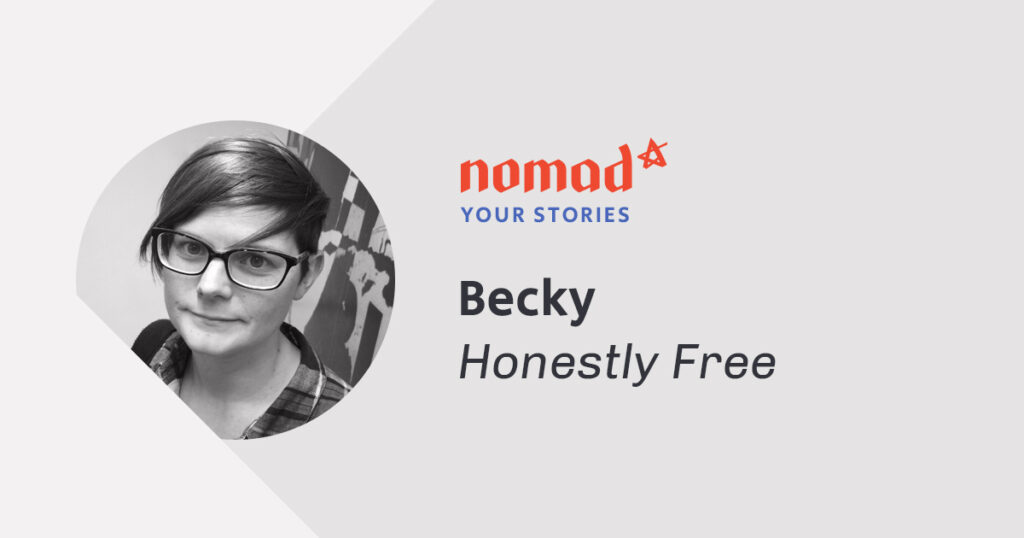Raised in a Christian family, I was an earnest and passionate teenager, listening to Newsboys and ready to be God’s hands and feet. I threw myself into exotic and sacrificial adventures for the Lord. In my early twenties I was offered a job co-ordinating short term missions trips for young people – it would have been my dream job just months before. But around that time, my experience of Christianity broke. It felt as though the ground had fallen away and there was no sure footing. I believe God was behind that spiritual experience, but it was painful and scary. All that remained was a sense that God was real and God was good – and vaguely ‘the whole Jesus thing’. Everything else was suddenly up for grabs and any simplistic or narrow answers just made me angry. I didn’t go to church much at all for the next five years, and when I did it was problematic and painful. I listened to Rob Bell sermons at home and trusted that me and God were still ok. Gradually the anger subsided and I felt ready to reconnect somehow.

Seven years ago, my husband and I decided to root ourselves in a low-income community, start going to a church in walking distance and invest our energies locally. We found a church that seemed to be everything I was hoping for – small, welcoming, rough around the edges, full of good-hearted people of a variety of ages and backgrounds. The church is still the same, although it’s grown. I’ve grown too.
As I have reconstructed faith and am more sure of what I *do* believe, not just what I no longer believe in, I have found it more and more difficult to fit in. (Thanks, Nomad Podcast.) I am grateful to have a few good friends who are on the same page, with whom I can speak freely, talk theology and life, and be myself. But outside of those safe spaces, it’s a different story. I’m naturally diplomatic and although I will readily speak my mind on politics or other issues, I’ve been cautious about rocking the boat when it comes to church. So over the last few years, I’ve held my tongue when I’ve felt that my different perspective might be confusing or unwelcome. After all, as I keep reminding myself, it isn’t my job to change anyone’s mind. Leading a house group with some very conservative evangelical members, my tongue-biting strategy became unbearable. I realised I had a deficit of integrity. I was fractured.
In other areas of life I found myself to be more integrated, my faith flowing into my work and friendships in a different, more comfortable and natural way as I embraced a wider view of God and began to trust the glimpses of Christ I recognised in others. But at church, not allowing myself to be truly honest with anyone was taking its toll. I often wondered if it would be easier to stop going or to find a church full of like-minded people. The less I ventured my opinions, the more I imagined the entire church to be a homogenous bloc who all agreed with each other but not with me. Which, surely, is not the case.
I have yet to find out. But I’ve decided that I need to be honest. I sometimes dream of a dramatic outburst: “…well I don’t agree with penal substitution and I’m gay affirming and the planet is literally on fire and we are all complicit and God has no gender and perhaps I am a universalist after all and WHAT OF IT?”. On reflection, I think a gentler approach might be more appropriate. I hope to become braver in answering questions honestly, offering alternative ideas when I’m faced with theology that I believe to be damaging, being more openly myself and hoping that people will deal with me kindly. They might not, of course, and I’m aware that many beloved listeners have shared painful stories of rejection for not following the party line in church.
But I believe something powerful happens when we live fully from the depths of ourselves, knowing we are loved, ready to love others, bringing our unique gifts and perspectives to the world. I want to leave judgement of others and fear of being judged behind. I want to live kindly, gently, with conviction and integrity. I want to show up to life with my whole self, whether that be at church, at the school gates, at work or online. I’m nowhere near arriving at that goal, but I have to start somewhere.
One more thing. A good friend of mine, with whom I did not always agree completely, died suddenly last week. I no longer care about the differences in our theology. I can only mourn the good friend that I have lost; the caring, compassionate, fiery woman that she was. I’ve realised that while I was holding my tongue, she didn’t hold back. She was the same person to everyone who knew her, never hiding her faith or opinions, and yet never pushing them on others. Surely what matters most is not what we think; not our current position on theology or politics or anything else. It’s how we live. We can choose to live with integrity, accepting ourselves as we are, extending grace to ourselves and to everyone around us. We can be brave and loving and free. Maybe that’s the gospel.
– Becky
